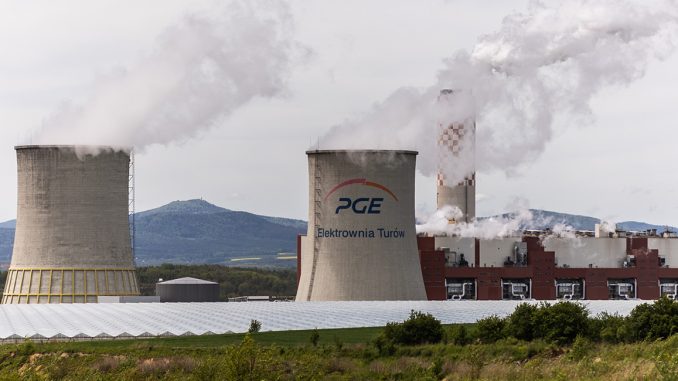
Poland lives in a rough neighborhood, sharing borders with Russia, Belarus, and Ukraine—with the historical scars to prove it. Indeed, few countries suffered more at the hands of tyrants than Poland did in the last century.
That’s one reason why Poland’s economic rise since the end of the Cold War is so remarkable. By 2022, the nation grew its gross domestic product to $627 billion from $181 billion just 23 years earlier.
It is obvious that transitioning away from a centrally controlled economy operating under Soviet authoritarian rule to a market economy was key to this success. However, this growth would never have occurred if Poland didn’t have access to affordable, reliable energy to fuel its economy—energy it has largely enjoyed since it gained independence in 1989.
Coal, natural gas, and oil have provided the preponderance of Poland’s energy for decades, and coal specifically remains the primary fuel for the electricity sector, providing around 72% of the nation’s electricity. This energy mix has been a winner for Poland with life expectancy as well as per capita GDP dramatically increasing since the end of the Cold War.
Despite efforts to the contrary, Poland is being forced to change what works by the European Union and its drive toward net-zero carbon emissions by 2050 to fight so-called climate change. The EU requires a series of complicated mandates, directives, and carbon credit systems.
Unfortunately, Polish leaders don’t have the luxury of “greenwashing” their future with grandiose ideas of replacing coal, oil, and natural gas with wind and solar as do their rich Western European colleagues.
First, despite its meteoric economic rise, Poland has some catching up to do to be among the wealthiest EU states. Second, given its history and geographic location, few countries have a greater appreciation for maintaining secure access to energy resources, which had traditionally been anchored in its tremendous domestic coal reserves.
With the EU’s mandate to reduce carbon dioxide emissions (read: reject coal) combined with Poland’s desire to keep growing economically while also maintaining energy security, the nation made the rational decision and decided to go nuclear.
In total, Poland plans to build two nuclear power plants with three large reactors at each plant for a total of 6-9 gigawatts of electricity. For comparison, a gigawatt is roughly enough power to supply a medium-sized city. Poland hopes to get its first new plant online by 2033, with subsequent reactors beginning operations every two to three years afterwards.
While these plants will not replace coal and natural gas in Poland’s energy mix, they will bring valuable diversity while also helping to meet its European Union carbon dioxide emissions obligations.
The Polish government understood that it would be necessary to collaborate with foreign reactor companies to construct the new plants, so it began communications with French, South Korean, and American firms. Upon consultation, the Polish government chose the American firms Westinghouse and Bechtel as partners for the initial plant construction.
This should be the end of the story. Poland is building a strong and secure energy economy, and the EU is getting massive reductions in carbon dioxide, which, by all appearances, is the union’s primary goal.
Win. Win.
But not so fast.
The European Union is now threatening to block Poland’s nuclear plans behind accusations that Poland may not have followed European competition rules, which require multiple bidders be considered and treated equally.
Such threats are counterproductive, potentially corrupt, and juvenile.
They are counterproductive because they hinder Poland’s energy security and the EU’s stated climate agenda.
They are potentially corrupt because the EU apparently wants a French firm to build the first plant, and France has close ties with the Brussels bureaucrats.
They are juvenile because the accusations seem to be more about hurt feelings and protectionism than fair play.
Though the exact details regarding the precise nature of Poland’s consideration of each bidder is not clear from media reports, what is clear is that Poland considered projects from at least three different groups.
Further, making any such determination about fair competition is nearly impossible when it comes to nuclear energy (or nearly any project within Europe). The entire process is crafted by state-run agencies and state-owned industries. And that is layered on top of a state-mandated energy policy to cut carbon dioxide, which is bolstered by any number of state-funded programs that distort the underlying economics of energy. Thus, for a state-owned nuclear company to bring accusations of unfair competition is beyond ironic.
Unfortunately, fair competition in energy markets is long gone in Europe.
But making the claim even more dubious is the “wink and nod” suggestion by EU bureaucrats that any EU efforts to block the Westinghouse/Bechtel deal could go away should Poland clarify that additional nuclear plants would be built by EU companies. In other words, the European Union just wants to make sure a European company gets a cut of the Polish business, regardless of actual “competition rules.”
Ultimately, however, none of this should really matter.
Poland is a sovereign country that has found a pathway to meet its requirements for secure access to energy resources and to help meet the EU’s climate goals. The EU should support Poland’s progress and respect its right to choose whomever they want to build their reactors.
And Poland must stand firm and move in whatever direction it deems best serves its long-term security and economic health.
Of course, no one knows that better than the Poles.
Have an opinion about this article? To sound off, please email letters@DailySignal.com, and we’ll consider publishing your edited remarks in our regular “We Hear You” feature. Remember to include the URL or headline of the article plus your name and town and/or state.

